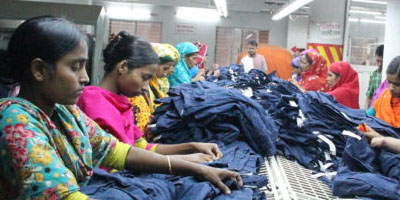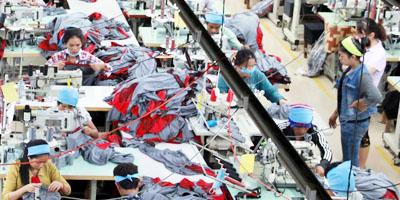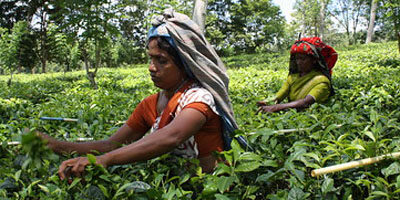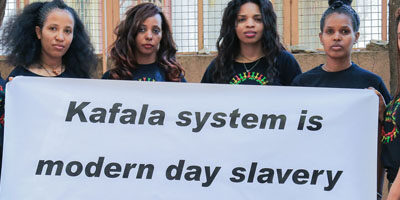Factory workers in Bangladesh are among the most harmed by the economic repercussions of the pandemic. Millions of workers have been sent home without enough pay to provide for their families. Ten million people – including workers and their families – are affected by the canceled contracts in the garment industry and factory closures.
Workers’ struggles for survival
Nazma Akter is the founder and director of Awaj Foundation, in Bangladesh, that advocates for workers’ rights in the garment industry. When I spoke with her recently about the current situation for the workers, she described their situation as a struggle for survival.
“Our workers are not scared about the disease, but they are scared about starving with their family and children,” she said, since the crisis worsened their already poor living conditions. Many factories had to reduce the pay of workers to 65% of their full salary, she says, and workers face police brutality if they demand their rights and protest the lowered wages.
“Our workers are begging, our workers are crying,” Akter said. “Our workers are vulnerable but nobody is taking responsibility. We need responsible business because that’s not fair.”
Factories coping with the crisis
The Bangladesh garment industry is being hit hard as the COVID 19 pandemic spreads around the globe, with millions of workers losing their jobs. International clothing brands are cancelling contracts, causing a ripple effect of economic downfall for factory owners and their workers. According to the Bangladesh Garment Manufacturers & Exporters Association (BGMEA), many contracts have been cancelled due to force majeure clauses in the agreements, even though factories had already committed to purchasing raw materials for production. Factory owners are unable to pay what is due to their suppliers, which puts them out of favour with their many contacts in the garment industry.
Mostafiz Uddin, the founder and CEO of Bangladesh Apparel Exchange, shares Akter’s concerns. “As orders are being cancelled by brands and retailers, how will the factories pay their workers’ salaries?” he said. “If the workers do not receive their salaries at the expected time, this will directly impact the livelihood of garment workers and their immediate dependents.”
Lotte Schuurman, a spokesperson for the Fair Wear Foundation, an international non-profit member organization that includes more than clothing 140 brands, also agrees that there is a crisis. “We knew it already, but now it has become clearer that wages of garment workers are too low to live off. Many of them live hand-to-mouth, which means that when factories close, it instantly creates huge problems for them.”
The shared responsibility of government and clothing brands
Factories are struggling with cash flow and are unable to pay workers, suppliers of raw materials, or even utility bills. “The inability to fulfil payments is creating lack of trust in the suppliers,” Uddin says. “It is jeopardizing long-term business relationships that have been created over years.”
Private banks have failed to provide support or allow factories to open new lines of credit, limiting the solutions to the cash flow problems. The government of Bangladesh has dedicated a stimulus package in support of the garment industry of four billion Taka (US $47 million). Factories that can get access to these loans may be able to pay their workers for a month, but it is unclear if they would be able to do more.
Schuurman said that healthcare is a concern. “Many manufacturing countries do not have the healthcare infrastructure needed to deal with a pandemic of this scale, and workers lack access to basic medical care.” Fashion brands should be accountable for the livelihood as well as the health of factory workers in Bangladesh, Akter says, and should be protecting those basic rights from violations.
Akter also believes that responsibility shouldn’t just lie with the brands, but that Western governments should be accountable and take legal action to protect workers. “We need to amend the laws, because more natural disasters and other crises will come. We need different policies and different legislation to protect workers.”
[Editor’s note: this article was prepared prior to the arrival of Cyclone Amphan in May, which left 500,000 people homeless.]Collective action and international pressure
Uddin and the Bangladesh Apparel Exchange are trying to raise awareness about the situation, and find solutions.
“The buyers and other stakeholders can collaborate and work jointly to withstand this crisis. Indeed, it’s a time when we should support each other to overcome this crisis that the global apparel industry is reeling from.” The BAE also tries to facilitate buyers and manufacturers working together to contain the crisis.
Through the Awaj Foundation, Akter is mobilizing to empower workers through grassroots movements to secure their basic rights. “We need transparency, we need accountability and we need punishment,” she says. “Brands bargain with factories for discounts, which usually means that workers are the ones who pay for these reductions. And we demand decent work, freedom of association, right to collective bargaining.”
Looking to the future
Some brands have stayed committed to the promised payments, which has created a positive impact. According to Schuurman, “We hear positive sounds about brands cutting on their own salaries, brands to paying for legal help for factories asking for government support.”
“It shows once again how decisive the power of clothing brands is,” she says. “The decisions they make every day at their headquarters have a direct impact on the factory floor and thus the lives of the people who make our clothes.”
These efforts are helping to reduce the harm but, to create significant change in the industry, the system and division of profit must be revised to protect the most vulnerable in the supply chain. There is recognition that the workers are the most valuable part of the garment industry, yet as is evident, they are undervalued and mistreated. This human rights crisis has existed for a while but became exacerbated through the pandemic.
“We hope that this crisis will be a turning point,” Schuurman says. “The closure of shops continues deep into the chain. When things get back on track, many of the factories that brands rely on may be bankrupt. So there is both a human and a business need for industry to embrace a new normal.”








David Schilling
Many investors in apparel companies are urging brands and retailers that source from Bangladesh and other countries to pay for what they have ordered, work collectively to get benefits for workers furloughed or fired and are living on the edge. I work for the Interfaith Center on Corporate Responsibility a coalition of investors who urge companies they own to address the crying need of workers as articulated by Nazma Akter of Awaj Foundation and commit to building a more just equitable and sustainable supply chain for the future. So many lives are at stake. We all need to do more to address the extraordinary situation workers and many suppliers find themselves in.
Amnah Hafiz
I am very proud of my sister Mishkat’s great work! It is a very insightful article that sheds light on a major industry issue. Great read!
Doaa Alim
I love the article it has given me both insight and empathy. Revealing the global trade power and the coronavirus impact affecting its cycle. Especially, those with minimum wages. Thank you